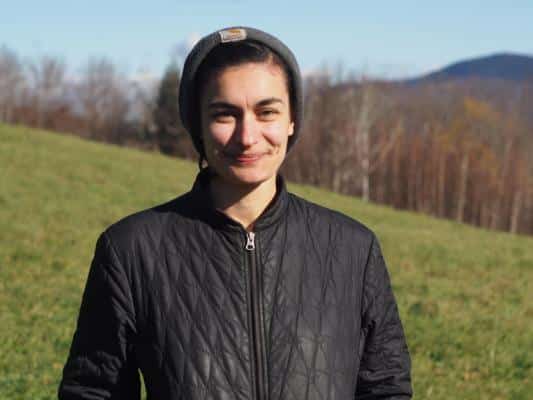
Johanna Doren MFALP’20, currently serves as Local Food Access Coordinator at Northeast Organic Farming Association of Vermont (NOFA-VT), a nonprofit organization with a mission to promote organic practices to build an economically viable, ecologically sound, and socially just Vermont agricultural system.
Sometimes you have to get hyper-local to enact the change you want to see.
Such was the experience of Johanna Doren, who graduated from Vermont Law and Graduate School (VLGS) with a Master of Food and Agriculture Law and Policy in 2020. Currently serving as Local Food Access Coordinator at Northeast Organic Farming Association of Vermont (NOFA-VT), Doren spent much of her time within the VLGS Center for Agriculture and Food Systems (CAFS) digging deep into how policy translates into action on the ground.
“It’s incredible to see how effective small-scale policy, down to town plans and municipal ordinances, can lift up a vibrant hyper-local food system in which all residents can grow or access the foods they want to eat,” said Doren. During her CAFS education, Doren completed an externship with Farm to Plate during which she studied not only municipal policies, but federal and state level regulations that affect food sovereignty in Vermont.
Food equity, access, and sovereignty are special interests of Doren’s that inform her current work with NOFA-VT.
“I am thrilled to work with an organization that prioritizes equity in our food system in so many ways,” Doren explained. “I coordinate a few programs that reduce the cost of local food while compensating producers fully.”
Doren emphasizes the opportunity that her current position gives her to challenge herself, a tip she gives to upcoming graduates. She advises current and future students to find something they are passionate about while cultivating a community that inspires, challenges, and supports them.
As a student, Doren worked on CAFS’s Labels Unwrapped Project, which aimed to address the confusion caused by food labels by providing an easy-to-navigate resource for consumers, producers, and those working in the food label area.
After graduating from VLGS, Doren worked on produce safety research with The Northeast Center to Advance Food Safety within the University of Vermont Extension, eventually publishing a literature review of research into contamination risks of dropped and drooping produce and its relationship to federal regulations like the Produce Safety Rule.
Doren attributes her proficiency in examining food system law and policy to the foundation of knowledge she built at VLGS. Through her VLGS courses, Doren was able to develop “a great basis of understanding for how laws dictate policy, how food and agriculture are governed in the United States, and how politics play a part in it all.”
This past year, Doren took part in the Vermont Farm Bill Nutrition Title Coalition, taking interest-holder feedback and developing policy priorities to pass along to Vermont policymakers during Farm Bill negotiations.
Doren chose VLGS hoping to learn more about federal food policy and how to change it. Having worked in various aspects of the food system before coming to VLGS, Doren witnessed the on-the-ground effects of food policy firsthand.
“I was frustrated with how hard nonprofits and community organizations have to work to fight against [inequitable] systems and create alternative paths for food security, farm viability, and land stewardship,” Doren said. “Small, organic food production is so greatly disincentivized compared to large-scale, conventional commodity crop production.”
To Doren, this work is more important now than ever.
“I don’t think it’s an understatement to say that the food system is in crisis,” said Doren. “The after-effects of the COVID-19 pandemic and record inflation have amplified the issues in our food system that were already there.”
A changing environment and climate have also wreaked havoc on the food system and on farmers who rely on it for their livelihood, Doren points out. Intense flooding in Vermont due to heavy rains in the summer of 2023 devastated many farmers’ crops and infrastructure, which had already been struggling due to harsh growing conditions during the season. As climate change accelerates, farmers will continue to face the consequences on their businesses, land, and food security of their communities (those who are compelled to support Vermont farmers impacted by summer flooding can donate to the NOFA-VT Farmer Emergency Fund).
There’s always more room to get involved and more work to do, Doren promised. Food insecurity, the cost of production, inadequate land access, and violations of farmworkers’ rights are just some of the issues that continue to plague the food system. While Doren advised that upcoming graduates at VLGS follow the work they’re passionate about, she doesn’t want the reality of the work ahead of them to be discouraging.
“There are a lot of issues with how our food system is structured, and an important act of resistance to these structures is remembering to rest and take pleasure so we don’t burn out,” Doren said.
Keeping the teachings of activists like adrienne maree brown in mind, Doren had one more piece of advice for current and future food system leaders: “Don’t forget to seek and embrace joy.”